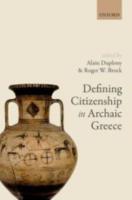
OUP (2018) h/b 370pp £80.00 (ISBN 9780198817192)
Readers of this volume are well advised to start with B.’s ‘Conclusion’ to the volume. From that they will learn that the volume is not really about ‘citizenship’, as a juridically defined status, at all. Rather it is about the variety of modes of ‘community participation’ within the archaic Greek world. Presumably we owe the title partly to the book’s origins in two conferences on archaic Greek citizenship, partly to the way in which, in the opening words of D.’s first chapter, ‘Citizenship is a major feature of contemporary national and international politics’.
If attracting readers primarily interested in the contemporary world is at issue, the volume might better have been entitled ‘How to do without citizenship’. For what the volume explores is how individuals identified themselves with, and in, a community by various forms of participation, and how a community could mobilise its inhabitants without needing to impose or require some defined juridical test. Different contributors variously stress the role of participation in the worship of the gods (Blok), in the armed defence of the city (van Wees), in the activities of the gymnasium (Fisher), in a wide and non-co-ordinated range of polis sub-groups (Ismard, Lupi), and in the Cretan andreion (Whitley). D. emphasises that community membership was a matter of performance (including the performance of gender, though, as the excellent index confirms, he has no interest in women), and Giangiulio shows that archaic bodies defined by number were inclusive rather than exclusive. You make yourself a member of a community, these chapters show, by the groups whose activities you join, by what you wear, and by what you do. That archaic community membership was not legally defined did not mean that it was not normative, but no single behavioural norm is at issue—there was significant pluralism.
B. suggests in his conclusion that a more formal definition of community membership became necessary only when communities, or, better, the groups, participation in which marked community membership, grew too large for local knowledge to suffice. He immediately notes as an exception Sparta, whose precocious development of a defined citizenship, to which a Teisamenos might be admitted (he was a seer from Elis, who also demanded his brother be made a citizen too) is discussed by Cartledge. B. plausibly links this Spartan exception to the presence of the helots. Seen like this, citizenship comes in when community membership breaks down, or when there are strong desires to prevent social mobility. This effectively reverses the teleological model, whereby various archaic institutions are seen as a matter of classical citizenship in the making, and suggests that formal definition of community membership was a sign of the failure of the social experiment that was the archaic polis. More importantly, it creates a new historical agenda of enquiry: why does the proliferation of associations found in the archaic period cease? What is it that members of communities are afraid of losing that they want to prevent social mobility? Quite apart from the richer historical understanding that this gives of the archaic Greek world, those are mutatis mutandis no bad questions for us to be asking of the contemporary world.
Robin Osborne
